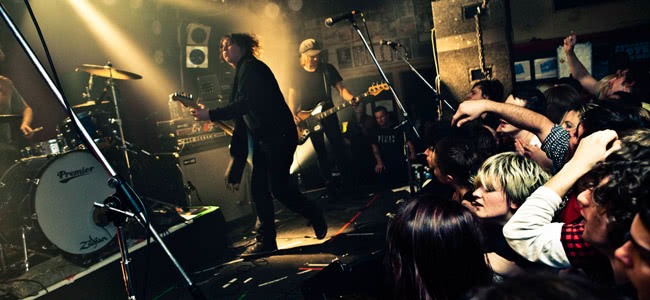This week, Sounds Australia and Federal Arts Minister Simon Crean appointed Dr Ianto Ware as Australia’s first National Live Music Coordinator, using his expertise to advise and consult on the state of Australia’s live music industry, and as an ongoing advocate to the government’s new National Cultural Policy.
“Dr Ware’s appointment as National Live Music Coordinator will further support contemporary Australian musicians and songwriters to go from the local to the international stage,” said Mr Crean, who emphasised Ware’s background as the CEO of Renew Adelaide and founding director of Format Adelaide, as well as years of experience working state and local governments, artists, venues, and local councils.
7 News now indicates that Dr Ware is setting his agenda as the National Live Music Coordinator, with a focus on easing the problematic state and national regulations that restrict the development of Australia’s live music scene, dealing with the number of venues closing their doors, and putting the interests of musicians first.
Dr Ware says that, over the next three years, he aims to identify ways of untangling the complex web of ‘party-killing laws’ – such as noise complaints, liquor licensing woes, and environmental concerns – that are damaging live music at a local level by formalising legislation between states, as well as making it easier on live music venues to operate their businesses, to keep open and stay open.
He calls the improvement of the domestic music scene a ‘critical investment’, particular for fostering talent and future musicians that want to develop a presence both locally and internationally, in a similar vein to the likes of The Jezabels and Gotye in recent years.
“Essentially we want to bring the dots together in terms of what’s going on state to state and make similar regulatory frameworks to help artists develop and be ready to export overseas,” said Dr Ware. “It all starts on the local level and what we’re seeing now are small venues that have never had major issues being arbitrarily put into a high risk position due to overlapping laws.”“Essentially we want to bring the dots together in terms of what’s going on state to state and make similar regulatory frameworks to help artists develop…” – Dr Ianto Ware
The last twelve months certainly reflects a turbulent year across Australia’s local music scene, Sydney was a tale of two cities that saw the State Government heavily policing alcohol-related crime and anti-social behaviour, even as City of Sydney council attempted to reinvigorate the culture despite the draconian enforcements. Similar problems could be found in Brisbane’s music rich Fortitude Valley, Western Australia’s ’50s era’ liquor laws, Melbourne’s post-SLAM climate following The Tote’s rescue in 2010; and Dr. Ware’s own Adelaide facing ongoing struggles with developing its cultural scene.
Dr Ware’s positions and views certainly seem to be on target with the concerns of live music lovers, who in recent years have seen some of Australia’s most iconic music venues nearly swallowed up – including the famous battle for Melbourne’s The Tote, Sydney’s Annandale Hotel resorting to its clever ‘buy-a-brick’ scheme to ensure its survival, while fellow long-running pub The Sando wasn’t so lucky, falling amidst controversy involving shifty banks and poor loan practices.
“The creep of legislation has resulted in lots of venues closing and has made it very difficult for others to run at a profit,” said Dr Ware, who says that encouraging dialogue between venue owners, the entertainment industry, and government agencies was key to striking a balance between concerns about public safety and cultural engagement.
“It’s a tricky topic and there’s always a balance between making sure a venue is safe and that liquor licensing is dealt with in a responsible manner,” he says. “The needs of nearby residents have to be respected and supported but we also have to make sure that artists have access to places and stages where they can actively produce the culture they live in.”




































